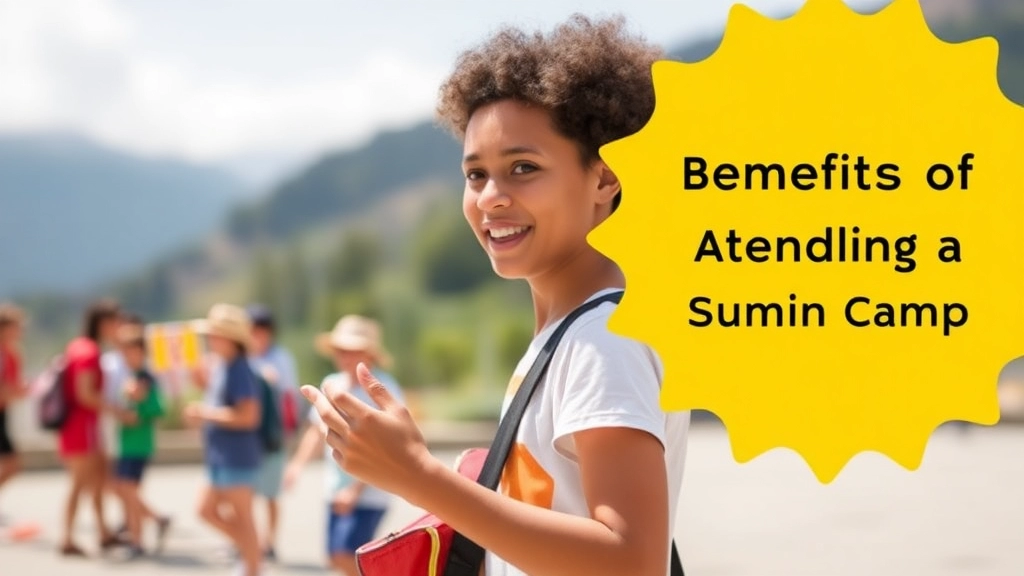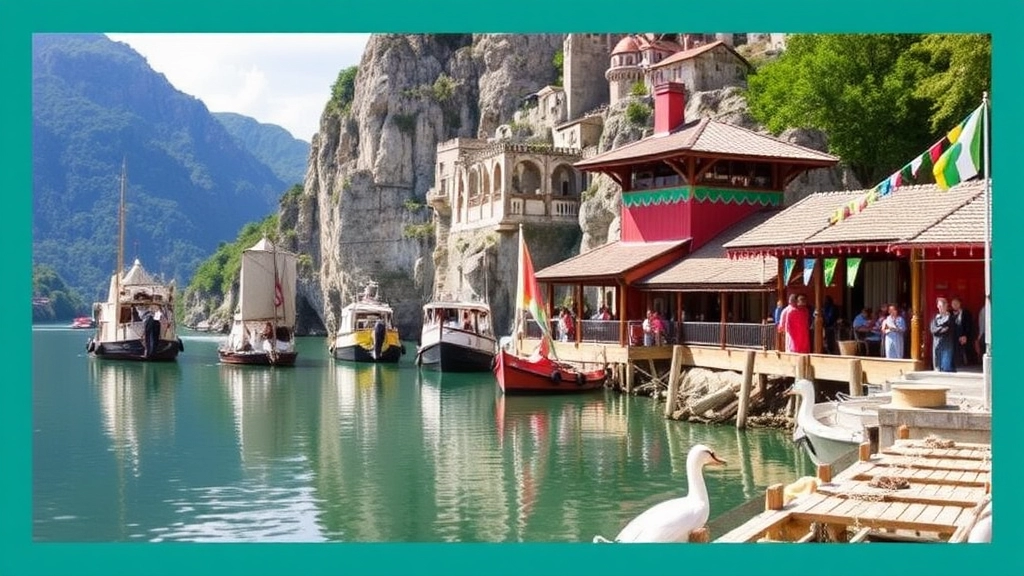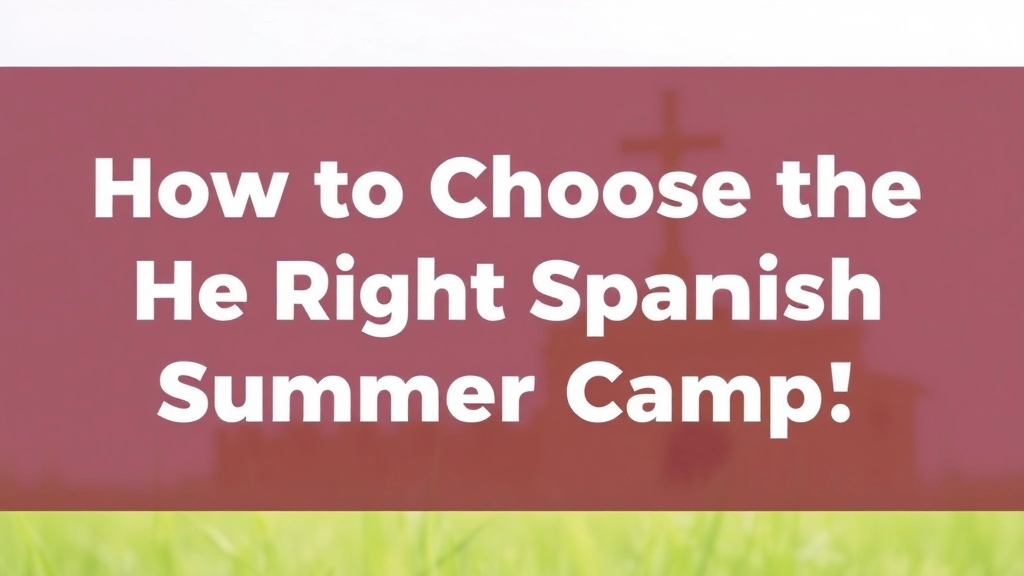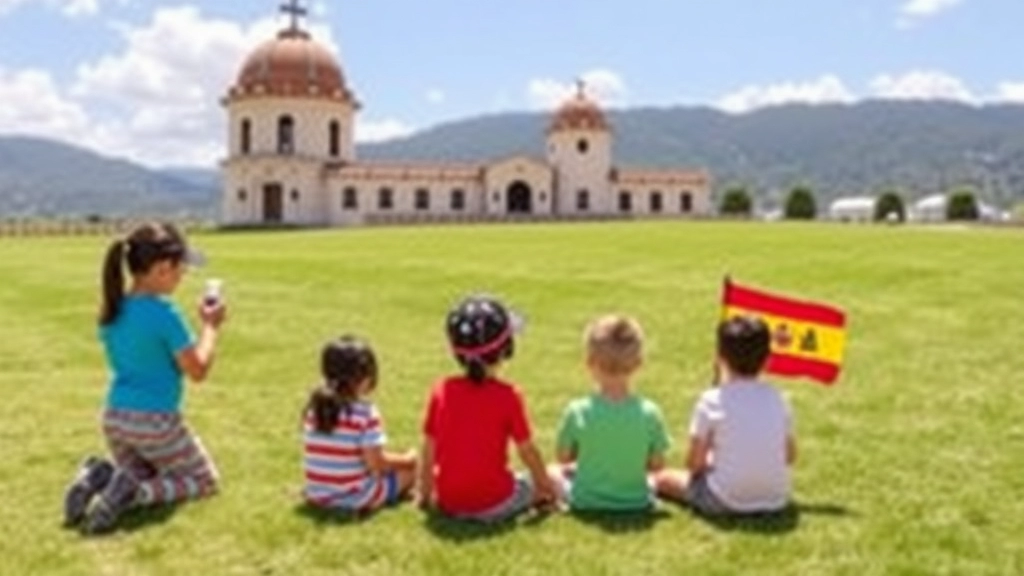Transform Your Summer into an Unforgettable Adventure
Are you ready to transform your summer into an unforgettable adventure? Spanish summer camps offer a unique blend of language immersion, cultural activities, and fun excursions that make learning Spanish a breeze. In this article, we’ll guide you through the various types of camps available, the benefits of attending, popular destinations, and tips for choosing the right camp for you or your child. Whether you’re a beginner or an advanced learner, there’s a program tailored just for you.
What to Expect
From language immersion techniques to accommodations and facilities, we’ll cover everything you need to know to make an informed decision. We’ll also share real reviews and testimonials from past participants to give you a firsthand look at what to expect. Ready to dive into a world of new experiences, friendships, and language skills? Let’s explore the exciting world of Spanish summer camps together!
Types of Spanish Summer Camps
So, you’re thinking about sending your kid to a Spanish summer camp, huh? Maybe you’re wondering, “What types of Spanish summer camps are out there?” Let’s break it down and make it super easy for you to decide.
Language Immersion Camps
First up, we’ve got Language Immersion Camps. These are like the OG of Spanish summer camps. The whole idea here is to surround your kid with Spanish 24/7. They’ll be speaking, listening, and even dreaming in Spanish by the end of it. These camps usually involve:
- Daily Spanish Classes: Structured lessons to build grammar and vocabulary.
- Conversational Practice: Kids get to chat with native speakers and fellow learners.
- Cultural Exposure: Think cooking traditional dishes or learning about Spanish festivals.
Adventure Camps with Spanish Lessons
Next, we’ve got Adventure Camps with Spanish Lessons. Perfect for the adrenaline junkies out there. These camps mix language learning with activities like hiking, kayaking, and zip-lining. It’s like learning Spanish on steroids.
- Morning Classes: Start the day with a couple of hours of Spanish lessons.
- Afternoon Adventures: Spend the rest of the day on thrilling activities.
- Team Building: Make new friends while practicing Spanish in real-world settings.
Sports Camps with Spanish Focus
Got a sporty kid? Sports Camps with a Spanish Focus might be the way to go. These camps combine sports training with language lessons. Whether it’s football, basketball, or even tennis, there’s something for every young athlete.
- Bilingual Coaches: Coaches who can switch between English and Spanish.
- Sports Drills: Learn the sport and the language at the same time.
- Friendly Matches: Play games with local teams to practice Spanish in action.
Arts and Crafts Camps
For the creative souls, there are Arts and Crafts Camps. These camps let kids dive into activities like painting, pottery, and drama, all while picking up Spanish.
- Art Classes in Spanish: Learn art techniques and Spanish vocab simultaneously.
- Creative Projects: Work on projects that require communication in Spanish.
- Showcase Events: Present their work in Spanish to an audience.
Family Camps
And let’s not forget Family Camps. These are perfect if you want to make it a family affair. Everyone gets to learn Spanish together, and it’s a great bonding experience.
- Family-Friendly Activities: Activities suitable for all ages.
- Group Lessons: Classes that cater to both kids and adults.
- Cultural Excursions: Explore Spanish culture as a family.
Real Questions You Might Be Asking
- âWill my kid really learn Spanish in just a few weeks?â
- âWhat if they don’t like the food or the activities?â
- âHow do I know which camp is the best fit?â
Quick Tips to Remember
- Ask for Reviews: Check out testimonials from past participants.
- Look at the Schedule: Make sure it includes a mix of learning and fun.
- Check the Staff: Ensure the camp has qualified and friendly staff.
By now, you should have a clearer picture of the different types of Spanish summer camps. Whether your kid is a budding artist, a sports enthusiast, or just looking to have some fun while learning a new language, there’s a camp out there for them. For more information on how to find the perfect camp, check out our guide on finding the perfect fit for your child. And if you’re looking for ways to make the camp experience even more memorable, don’t miss our tips on creative summer camp sign ideas.
Benefits of Attending a Spanish Summer Camp

Ever wondered why attending a Spanish summer camp could be a game-changer for you or your kids?
Let’s break it down.
Why Bother with a Spanish Summer Camp?
First off, language skills.
You know how tough it is to learn Spanish from a textbook?
Yeah, boring and ineffective.
But at a Spanish summer camp, you’re living the language.
You’re talking, listening, and thinking in Spanish all day.
It’s like hitting the fast-forward button on your language learning.
Real-Life Experience
Imagine ordering tapas in Spanish, chatting with locals, or even negotiating a market deal.
These camps throw you into real-life situations.
You’re not just learning; you’re living it.
Making Friends from Around the World
You’ll meet people from all over.
Different cultures, different backgrounds, but all with one goal: to learn Spanish.
You build friendships that last a lifetime.
Boosting Confidence
Ever felt shy speaking a new language?
Spanish summer camps are a safe space.
Everyone’s in the same boat, so you can practice without fear of judgment.
Cultural Immersion
It’s not just about the language.
You get to dive deep into Spanish culture.
Think flamenco dancing, cooking paella, or exploring historic sites.
Academic and Career Benefits
Learning Spanish opens doors.
It looks great on your CV.
It can boost your grades.
And it’s a skill that’s in demand.
Fun and Adventure
Let’s be honest.
Summer camps are fun.
You’re exploring new places, trying new foods, and making memories.
Quick Recap
- Language Skills: Fast and effective learning.
- Real-Life Experience: Practical use of Spanish.
- Global Friendships: Meet people from all over.
- Confidence Boost: Safe space to practice.
- Cultural Immersion: Dive into Spanish culture.
- Career and Academic Benefits: Boost your CV and grades.
- Fun and Adventure: Have the time of your life.
So, if you’re on the fence about attending a Spanish summer camp, think about all these benefits.
It’s not just a camp.
It’s an experience that can change your life.
Popular Destinations for Spanish Summer Camps
Ever wondered where to send your kids for a summer camp that’s not just fun but also educational? Spanish summer camps are a fantastic option. But let’s get realâchoosing the right destination can be a headache. You want a place that’s safe, enriching, and, most importantly, where your kids can actually pick up some Spanish. So, where are the hotspots for Spanish summer camps? Let’s dive in.
Spain: The Obvious Choice
Why Spain? Well, it’s the heart of the Spanish language and culture. Plus, who wouldn’t want to spend a summer in sunny Spain? Here are some top picks:
- Barcelona: This city is a blend of modernity and history. Camps here often include city tours, beach activities, and visits to iconic landmarks like the Sagrada Familia.
- Madrid: The capital city offers a rich cultural experience. Camps in Madrid usually include museum visits, flamenco shows, and excursions to nearby cities like Toledo.
- Seville: Known for its vibrant festivals and historic sites, Seville offers a more traditional Spanish experience. Think flamenco dancing and bullfighting (don’t worry, it’s just a show).
Latin America: A Cultural Melting Pot
If you’re looking for something a bit different, Latin America offers some fantastic options. Here are a few:
- Mexico: Camps in Mexico often focus on both language and cultural immersion. Kids can explore ancient ruins, enjoy beach activities, and even learn to cook Mexican cuisine.
- Costa Rica: Known for its biodiversity, Costa Rica is perfect for nature lovers. Camps here usually include eco-tours, zip-lining, and Spanish lessons in the midst of lush rainforests.
- Argentina: For a taste of South American culture, Argentina is a great choice. Camps here often include tango lessons, visits to historic sites, and excursions to natural wonders like Iguazu Falls.
The USA: Closer to Home
Believe it or not, you can find excellent Spanish summer camps right in the USA. These camps often bring native Spanish speakers to teach and interact with the kids.
- California: With its large Spanish-speaking population, California is a great place for a Spanish summer camp. Camps here often include beach outings, city tours, and cultural festivals. For more local options, check out these top picks for summer camps in OC.
- Texas: Another state with a rich Hispanic heritage, Texas offers camps that focus on both language and cultural activities. Think rodeos, Tex-Mex cooking classes, and visits to historic sites. For a broader overview of summer camp costs, you might find this guide on average summer camp costs helpful.
Europe Beyond Spain
If you’re looking for something a bit more off the beaten path, consider other European countries where Spanish is widely spoken or taught.
- France: Some camps in France offer Spanish immersion programs, often in partnership with local Spanish-speaking communities.
- Germany: Believe it or not, Germany has a growing number of Spanish summer camps, particularly in cities with large Spanish expatriate communities.
Age Groups and Programs Offered

Ever wondered if a Spanish summer camp is right for your kid? Or maybe you’re thinking about signing up yourself?
Let’s break it down.
Age Groups
Spanish summer camps cater to a wide range of age groups. Here’s a quick look:
- Kids (7-12 years old): Perfect for young learners. They get to have fun while picking up the basics of Spanish.
- Teens (13-17 years old): More advanced programs. Teens dive deeper into the language and culture.
- Adults (18+ years old): Yes, adults can join too! Tailored to different proficiency levels, these camps are great for anyone looking to improve their Spanish.
Programs Offered
Now, let’s talk about the types of programs these camps offer.
- Beginner Programs:
- For those who know nada about Spanish.
- Focuses on basic vocabulary and phrases.
- Lots of interactive activities to make learning fun.
- Intermediate Programs:
- For those who can hold a simple conversation.
- Emphasis on grammar and expanding vocabulary.
- Includes cultural immersion activities.
- Advanced Programs:
- For the pros.
- Focuses on fluency and complex structures.
- Involves debates, presentations, and advanced cultural activities.
- Specialised Programs:
- Business Spanish: Learn the lingo for the corporate world.
- Medical Spanish: For healthcare professionals.
- Exam Prep: For those gearing up for DELE or other Spanish proficiency tests.
Real Talk
I know what you’re thinking.
“Is it worth it?”
Picture this: Your kid comes back not only speaking Spanish but also with stories of new friends and adventures. Or maybe it’s you, impressing your colleagues with your newfound language skills.
Quick Tips
- Assess the Level: Make sure to choose a program that matches the current proficiency level.
- Check the Age Groups: Ensure your child will be with peers of the same age.
- Look for Specialised Programs: If you have specific needs, like business or medical Spanish, pick a camp that offers these.
And remember, the right Spanish summer camp can be a game-changer.
Ready to dive in?
Language Immersion Techniques Used
Ever wondered how to really get the hang of Spanish? Not just the textbook stuff, but the real deal? That’s where Spanish summer camps come in. They use some killer language immersion techniques that make learning Spanish feel like second nature. Let’s dive into the nitty-gritty of how these camps get you speaking like a local in no time.
Real-World Conversations
One of the best parts? You’re thrown into real-world conversations from day one. Forget those boring grammar drills. You’ll be chatting with native speakers, making friends, and even ordering your own meals. It’s all about practical usage.
Total Immersion
Imagine waking up, eating, and even dreaming in Spanish. That’s what total immersion is all about. You’re surrounded by the language 24/7. This approach makes you think in Spanish, which is a game-changer.
Interactive Classes
No one likes sitting through dull lectures. Camps use interactive classes that get you involved. Think role-playing, debates, and group projects. These activities make learning fun and effective.
Cultural Integration
Language isn’t just words; it’s culture. Camps integrate cultural activities like cooking classes, dance lessons, and local excursions. You get to learn the language and the culture behind it, making it stick in your brain.
Technology and Apps
In this digital age, why not use tech to your advantage? Camps often incorporate apps and online tools to reinforce what you’ve learned. These can include language games, flashcards, and even virtual reality experiences.
One-on-One Tutoring
Sometimes, you need that extra push. Many camps offer one-on-one tutoring sessions to focus on your weak points. It’s like having a personal coach for your Spanish journey.
Peer Learning
Learning with peers can be super effective. You’ll find yourself picking up slang, idioms, and natural speech patterns just by hanging out with your fellow campers. It’s like a mini Spanish-speaking community.
Structured Programs
Camps have structured programs tailored to different levels. Whether you’re a newbie or almost fluent, there’s a program for you. This ensures you’re always challenged but never overwhelmed.
Storytelling and Role-Playing
Remember how stories stick with you? Camps use storytelling and role-playing to teach you the language. You might act out a scene from a movie or tell a story in Spanish. It’s engaging and helps you remember better.
Feedback and Assessments
Regular feedback and assessments keep you on track. You’ll know what you’re doing right and where you need improvement. This constant loop of feedback ensures you’re always progressing.
So, if you’re serious about mastering Spanish, these immersion techniques are the way to go. They’re practical, engaging, and, most importantly, effective. Ready to dive in and become fluent? Spanish summer camps have got you covered.
For more insights on how summer camps can offer enriching experiences, check out our guide on the lifetime benefits of summer camps.
Cultural Activities and Excursions

Ever wondered if a Spanish summer camp is more than just language drills?
You’re not alone.
Many parents and teens worry about it being all work and no play. But guess what? Spanish summer camps are packed with cultural activities and excursions that make learning fun and immersive.
Why Cultural Activities Matter
Learning Spanish isn’t just about grammar and vocabulary. It’s about diving into the culture, the traditions, the food, and the lifestyle. Here’s what you can expect:
- Cooking Classes: Learn to make paella or tapas. Trust me, nothing bonds people like cooking together.
- Dance Lessons: Flamenco, salsa, or tango. You’ll not only learn the steps but also the stories behind these dances.
- Local Festivals: Participate in local fiestas. It’s like being part of a big, happy family.
Excursions: Learning Beyond the Classroom
Now, let’s talk about excursions. These trips aren’t just fun; they’re educational experiences that bring the language to life.
- Historical Tours: Visit ancient ruins or medieval castles. Feel the history while practising your Spanish.
- Nature Hikes: Explore national parks or coastal trails. Nature walks offer a relaxed setting to chat in Spanish.
- City Tours: Wander through bustling markets, iconic landmarks, and hidden gems. Real-world practice at its best.
Real Stories, Real Experiences
I remember my first Spanish summer camp. We had a guided tour of the Alhambra in Granada. The guide spoke only in Spanish, and at first, I was lost. But by the end of the tour, I was asking questions and even cracking jokes in Spanish.
That’s the magic of immersion.
The Benefits
- Enhanced Language Skills: Real-world practice helps you pick up slang and colloquial phrases.
- Cultural Understanding: You get a deeper understanding of Spanish culture, making your language skills more authentic.
- Social Skills: Bonding with fellow campers during these activities builds lifelong friendships.
How to Make the Most of It
- Be Curious: Ask questions. Locals love to share their culture.
- Participate Actively: Don’t just watch. Engage. Dance, cook, explore.
- Reflect: After each activity, take a moment to jot down new words or experiences. It helps cement your learning.
So, if you’re considering a Spanish summer camp, rest assured it’s not all about textbooks. The cultural activities and excursions make it a holistic, engaging experience.
Accommodation and Facilities
Worried about where you’ll be staying at a Spanish summer camp? Let’s break it down so you know exactly what to expect. Finding the right accommodation and facilities can make or break your camp experience, and I get it â you want it to be awesome!
Types of Accommodation
First off, let’s talk about the types of places you might be staying:
- Dormitories: Most camps offer shared dorms, which can be a blast. Think of it as a giant sleepover with new friends from all over the world.
- Host Families: Want to dive deep into the culture? Staying with a local family can give you that authentic experience. You’ll get to practice Spanish in real-life situations every day.
- Private Rooms: If you need your own space to recharge, some camps offer private rooms. It’s a bit more expensive but worth it if you value your privacy.
Facilities You Can Expect
Now, onto the facilities. You don’t want to end up in a place where the Wi-Fi is spotty and the bathrooms are dodgy, right? Here’s what you should look for:
- Classrooms: Modern and equipped with all the tech you need for interactive learning.
- Dining Hall: Nutritious meals are a must. Some camps even cater to special diets like vegan or gluten-free.
- Sports Facilities: From swimming pools to football pitches, having access to sports facilities can make your stay more enjoyable.
- Common Areas: Chill zones where you can hang out, play games, or just relax. Think lounges, game rooms, and outdoor terraces.
- Medical Facilities: On-site medical staff or easy access to local healthcare ensures you’re taken care of in case of any mishaps.
Real Stories, Real Insights
Let me share a quick story. Last summer, I attended a Spanish camp in Barcelona. The dorms were super clean, and the common areas were always buzzing with activities. We had everything from movie nights to salsa dancing lessons. The food? Absolutely delicious â I still dream about the paella we had on the last night!
Choosing the Right Fit
When picking a camp, consider what’s most important to you:
- Social Interaction: If you love meeting new people, go for dorms or host families.
- Privacy: If you need your own space, look for camps that offer private rooms.
- Facilities: Make sure the camp has all the amenities you need to stay comfortable and engaged.
The keyword here is accommodation and facilities. Whether you’re staying in dorms, with a host family, or in a private room, make sure the camp offers the right mix of comfort and amenities to make your experience unforgettable. Trust me, a good setup can make all the difference!
If you’re looking for more inspiration on how to design your summer camp experience, check out our Summer Camp Cabin Bunk Safety and Design Tips and don’t miss our Balanced Summer Camp Menu Ideas and Tips to ensure you have a well-rounded experience.
How to Choose the Right Spanish Summer Camp

Feeling overwhelmed about choosing the right Spanish summer camp?
You’re not alone.
Let’s break it down and make this decision a breeze.
1. What’s Your Goal?
First off, why do you want to attend a Spanish summer camp?
- Language Proficiency: Are you aiming to become fluent?
- Cultural Immersion: Do you want to soak up the culture?
- Fun and Adventure: Or is it all about having a blast while learning something new?
2. Location, Location, Location
Where do you want to go?
- Spain: Think Madrid, Barcelona, or Valencia.
- Latin America: Mexico, Costa Rica, or Argentina.
Each place offers a unique vibe and experience.
3. Age Groups and Programs
Make sure the camp caters to your age group.
- Kids and Teens: Usually have more structured activities and supervision.
- Adults: Often have more flexible schedules and advanced language classes.
4. Language Immersion Techniques
What kind of teaching methods do they use?
- Full Immersion: Only Spanish is spoken, even during meals.
- Partial Immersion: Some English is allowed, especially in beginner classes.
5. Cultural Activities and Excursions
Check out the extras.
- Excursions: Day trips to local attractions.
- Activities: Cooking classes, dance lessons, or sports.
These can make a huge difference in your experience.
6. Accommodation and Facilities
Where will you stay?
- Homestay: Live with a local family.
- Dormitory: Stay in a shared room with other campers.
- Private Room: Have your own space.
7. Reviews and Testimonials
What do past participants say?
- Read Reviews: Look for honest feedback.
- Ask for References: If possible, talk to someone who has been there.
8. Budget
How much are you willing to spend?
- All-Inclusive: Some camps cover everything—tuition, accommodation, meals, and activities.
- A La Carte: Pay for what you need.
9. Safety and Support
What kind of support is available?
- 24/7 Support: Is there someone you can contact at any time?
- Medical Facilities: Are there nearby hospitals or clinics?
10. Flexibility and Customisation
Can you tailor the programme to your needs?
- Flexible Dates: Can you start and end when you want?
- Customisable Programs: Can you choose your activities and classes?
Tips for Preparing for a Spanish Summer Camp
Alright, so you’re gearing up for a Spanish summer camp, huh? Exciting times ahead! But I get it, the prep can be a bit overwhelming. Let’s break it down into simple, actionable steps so you’re not just ready, but pumped to dive into this adventure.
Learn Basic Spanish Phrases
First things first, you don’t need to be fluent, but knowing a few basic Spanish phrases will make your life a lot easier. Think of it as your survival kit. Here are some essentials:
- Hola (Hello)
- Gracias (Thank you)
- ¿Dónde está…? (Where is…?)
- ¿Cuánto cuesta? (How much does it cost?)
- Lo siento (I’m sorry)
These phrases will help you navigate daily interactions and show the locals that you’re making an effort.
Pack Smart
Packing for a summer camp isn’t just about stuffing your bag with clothes. Here’s a checklist to keep you on track:
- Comfortable Clothing: Think light, breathable fabrics.
- Sun Protection: Sunscreen, a hat, and sunglasses are non-negotiable.
- Spanish-English Dictionary: Handy for quick translations.
- Notebook and Pen: For jotting down new words and phrases.
- Reusable Water Bottle: Stay hydrated, folks!
Get Your Documents in Order
Nothing kills the vibe faster than missing paperwork. Make sure you have:
- Passport/Visa: Double-check the expiration dates.
- Health Insurance: Ensure it covers you abroad.
- Camp Registration Forms: Print out any required documents.
Brush Up on Cultural Etiquette
Understanding cultural norms can save you from awkward situations. For example:
- Greetings: A kiss on the cheek is common in many Spanish-speaking countries.
- Meal Times: Dinner might be later than you’re used to, often around 9 PM.
Set Realistic Goals
What do you want to achieve at this camp? Improve your Spanish? Make new friends? Experience the culture? Setting clear, realistic goals will help you stay focused and make the most out of your experience.
Stay Open-Minded
You’re stepping into a new culture, and things might be different from what you’re used to. Embrace it! The food, the customs, the daily routinesâthese are all part of the adventure.
Tech Prep
Download useful apps that can make your life easier:
- Duolingo or Babbel: For quick language lessons.
- Google Translate: For on-the-go translations.
- Maps.me: For offline maps.
Health and Safety
Your well-being is crucial. Here are some tips:
- Vaccinations: Check if you need any specific shots.
- First Aid Kit: Include basics like band-aids, antiseptic wipes, and any personal medications.
- Emergency Contacts: Have a list of local emergency numbers and camp contacts.
Mental Prep
Last but not least, get your mind in the game. You’re going to be away from home, maybe for the first time. It’s normal to feel a mix of excitement and nerves. Talk to past participants if you can, read reviews, and remember why you signed up in the first place.
Got any more questions or tips to add? Drop them in the comments below. ¡Vamos!
Reviews and Testimonials from Past Participants
Are you wondering if a Spanish summer camp is worth it?
Maybe you’re thinking, “Will I really learn anything?” or “Is it just a holiday with some Spanish thrown in?”
Well, you’re not alone.
Let’s dive into some real reviews from past participants.
What Past Campers Are Saying
“I was nervous at first…”
Many start off feeling unsure.
But trust me, most end up loving it.
Here’s why:
- Immersive Experience: You’re not just learning in a classroom. You’re living it. Every meal, every game, every chat is in Spanish. It’s intense but effective.
- Confidence Boost: Speaking a new language is scary. But by the end, you’ll be chatting away. It’s like ripping off a plaster â quick and a bit painful, but worth it.
“The cultural activities were a game-changer.”
Campers rave about the cultural side.
Why?
Because it’s not just about language.
It’s about understanding the culture.
- Cooking Classes: Learn to make paella like a pro.
- Local Excursions: Visit historic sites and chat with locals.
- Dance and Music: Flamenco anyone?
What Parents Are Saying
Parents have their own concerns.
Safety, learning, value for money.
Here’s what they say:
- Safe and Secure: Camps take security seriously. Trained staff, safe locations, and structured activities.
- Value for Money: It’s not just a holiday. It’s an investment in your child’s future.
Real Stories, Real Impact
Sarah, 16
She was shy.
After camp?
She was leading group discussions.
Her secret?
Confidence through immersion.
Tom, 14
Struggled with Spanish in school.
After camp?
Top of his class.
His trick?
Learning by doing.
Why These Reviews Matter
These stories aren’t just fluff.
They’re real.
They show the impact a Spanish summer camp can have.
So, if you’re on the fence, think about these experiences.
And remember, the keyword here is Spanish summer camp.
It’s not just a camp.
It’s a life-changer.
For more insights on camp experiences, check out our exploration of summer camp culture. Also, discover the ultimate guide to summer camp scholarships to make these experiences more accessible.
FAQs About Spanish Summer Camps
What are the primary benefits of attending a Spanish summer camp?
Spanish summer camps offer numerous benefits including enhanced language skills, real-life experiences, global friendships, boosted confidence, cultural immersion, academic and career advantages, and a fun and adventurous environment.
What age groups are Spanish summer camps suitable for?
Spanish summer camps cater to a wide range of age groups:
- Kids (7-12 years old): Ideal for young learners to have fun while picking up basic Spanish.
- Teens (13-17 years old): More advanced programs for deeper language and cultural immersion.
- Adults (18+ years old): Tailored to different proficiency levels, suitable for anyone looking to improve their Spanish.
What types of programs do Spanish summer camps offer?
Programs range from beginner to advanced levels, including specialized courses like business Spanish, medical Spanish, and exam preparation. Each program focuses on different aspects such as basic vocabulary, grammar, fluency, and cultural immersion activities.
Are there cultural activities and excursions included in the camp?
Yes, Spanish summer camps often include cultural activities like cooking classes, dance lessons, and participation in local festivals. Excursions may include historical tours, nature hikes, and city tours, providing real-world practice and deeper cultural understanding.
How do I choose the right Spanish summer camp?
Consider factors like your goals (language proficiency, cultural immersion, fun), location (Spain or Latin America), age groups, teaching methods, cultural activities, accommodation options, reviews and testimonials, budget, safety and support, and the flexibility of the program.
What kind of accommodation is available at Spanish summer camps?
Accommodation options typically include homestays with local families, dormitory-style shared rooms, and private rooms. Each option offers a different level of immersion and privacy.
Are Spanish summer camps suitable for complete beginners?
Yes, many camps offer beginner programs that focus on basic vocabulary and phrases with interactive activities to make learning fun and effective.
What teaching methods are used in Spanish summer camps?
Teaching methods vary but may include full immersion (only Spanish spoken) or partial immersion (some English allowed). The approach depends on the proficiency level of the participants.
Can adults join Spanish summer camps?
Absolutely. There are programs specifically designed for adults, tailored to different proficiency levels and often with more flexible schedules and advanced language classes.
What are the advantages of cultural immersion activities in these camps?
Cultural immersion activities enhance language skills, provide a deeper understanding of Spanish culture, and build social skills through bonding with fellow campers.
How can I make the most out of my Spanish summer camp experience?
Be curious, actively participate in all activities, and reflect on your experiences by jotting down new words or insights. This helps cement your learning and makes the experience more enriching.
What should I look for in reviews and testimonials of Spanish summer camps?
Look for honest feedback about the camp’s teaching methods, cultural activities, accommodation, and overall experience. If possible, talk to someone who has attended the camp for firsthand insights.
References
-
Benefits of Learning Spanish
-
Why Learn Spanish Abroad
-
Top 5 Benefits of Learning Spanish in a Foreign Country

